The Age of Adderall
Students at West High are turning to prescription medications to increase their focus and excel in sports. Adderall, commonly prescribed for ADD/ADHD, is the drug of choice.
All sources in this story have been given aliases, as they chose to remain anonymous.
“Who got Addy?”
These are the words Roger, a West High athlete, heard minutes before he went out to compete. He recalls how one of his teammates just “popped it open and distributed it to everyone.”
“Addy” refers to Adderall, an amphetamine that was first used on the mass scale during World War II. According to the U.S. national archives, a 1945 survey of German soldiers shows that the majority that used amphetamines “made their own rules” and took it “whenever they felt like it,” instead of as directed. It is now commonly prescribed to people with Attention Deficit Disorder (ADD) and Attention Deficit Hyperactivity Disorder (ADHD), and the theme of not using the drugs “as directed” prevails. Roger doesn’t have attention disorders, and neither do most of his teammates. Wesley, the teammate providing the Adderall, first acquired a prescription in fifth grade. Wesley only takes the 20-milligram pill when he needs to study or compete in the sport, although the prescription states he is supposed to take it daily. He provides it to his teammates for free.
“It literally makes you forget you’re tired. It’s like a cheat code, almost,” Roger said.
Carl also participated in athletics. He took Adderall for three years with a prescription and recently stopped.
“You never get tired so you don’t know when you’ll pass out,” he said. “I blacked out four times in [my sport] because I didn’t know where my breaking point was.”
Roger doesn’t think there are any repercussions for getting caught taking it for the sports. The only way he can see anyone getting in trouble would be if a parent didn’t want their kid taking it.
Athletes caught doing anything illegal, such as drinking or smoking marijuana, have the potential to be kicked out of athletics. Adderall is a schedule II narcotic, making it illegal to even carry in the United States without a prescription.
“I would hope morally and ethically our students would compete within the spirit of the rules,” said Athletic Director Craig Huegel. “The difficult part is, Adderall is very beneficial for those who legitimately need it.”
With prescription drugs, there is a gray area that exists for regulation. Many people take Adderall just so they have the ability to function normally. According to school nurse Megan Carlson, at West High alone there are just shy of 200 kids that have reported their ADHD/ADD diagnosis. This isn’t counting those who don’t report it, or those with anxiety (83 students) or depression (43 students).
According to West High assistant principal Lucas DeVries, that gray area isn’t so gray when a student is at school. Students are not allowed to carry any medication whatsoever when they are at school, even with a prescription, and must access their medication from the health office.
If a student is suspected of having any illegal substances with them, the school has the right to search them without a warrant.
“We’re not law enforcement, so we don’t need probable cause to go through stuff. We just need reasonable suspicion,” DeVries said. “Any time there is a concern that a student may have an illegal substance on campus that is jeopardizing the safety of that student and possibly others, it’s our job to investigate.”
This reasonable suspicion can range from getting a tip from another student, or seeing a student get out of a fogged-up car.
Lockers, backpacks and cars on school property all have the potential to be searched. If a student says no to the search, the problem escalates outside of the school building.
“It’s better for a school administrator than a police officer here going through all of your stuff. The school takes a little bit different approach than a police officer,” he said. “The school will also always make parent contact, meet with parents, make sure the student is safe to go home and provide resources for help outside of the school if necessary.”
Depending on the situation, a student has the potential to be suspended or expelled. If a student is a repeat offender, they have the potential to be sent to Theodore Roosevelt Education Center (TREC).
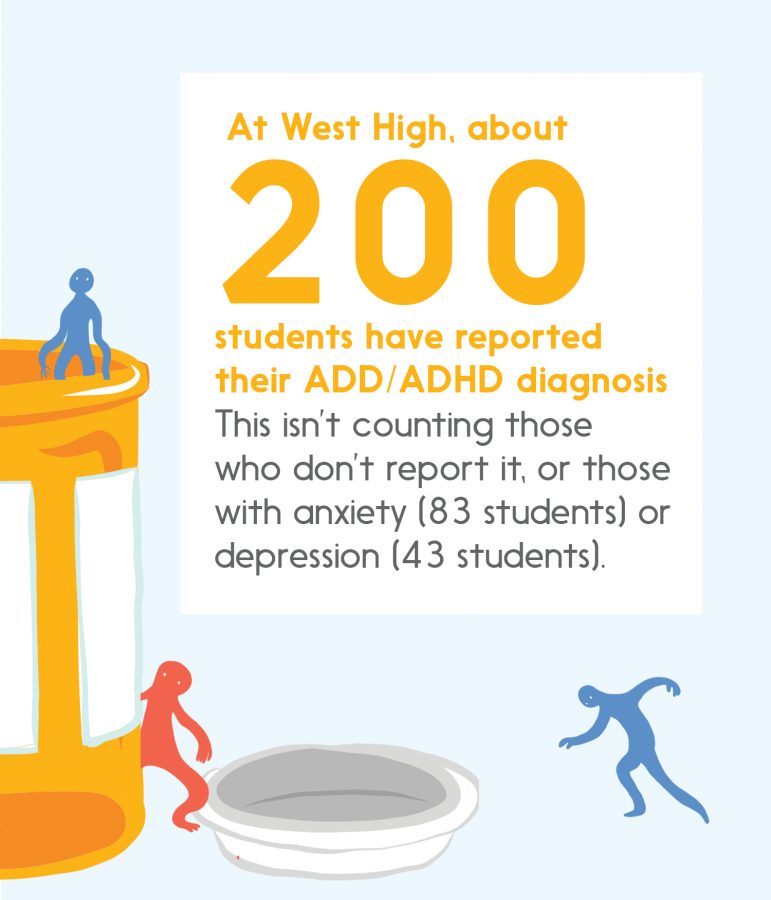
However, students who are taking Adderall illegally aren’t always taking it at school—they’re taking it for standardized testing. Because many students take drugs in order to function, the American College Test (ACT) has no way of regulating prescription drug usage. The Food and Drug Administration (FDA) states that only in rare occasions should someone take more than 40 mg a day. Before the ACT, Roger took 110 mg of Adderall.
“I was freezing and sweating at the same time, and that’s the only weird thing I’ve felt. I’ve never felt shitty on the comedown,” he said.
Roger scored a 27 on the ACT the first time he took it, which was without Adderall. After taking the 110 mg, he received a score of a 30. He didn’t study any more or get any more sleep than the day he got a 27.
Despite this, Ed Colby, Senior Director of Media and Public Relations at ACT, does not believe that Adderall would inherently raise test scores.
“The ACT measures what students have learned in their classes in school. A medication like [Adderall] wouldn’t give them knowledge they don’t already have,” Colby said.
Colby continued to reiterate this, as well as mention that there are no restrictions on medications that a student is on during the ACT. Even if a student is taking Adderall, there would be no way for them to drug test that student. Additionally, many students take Adderall with a prescription, and it would be near impossible to regulate what medications people were taking before the test.
Although Colby states Adderall won’t add knowledge to the brain, the medication is proven to improve focus. According to Clinical Professor of Psychiatry Michael Flaum MD, if you perform cognitive tests on almost any person before and after taking Adderall, you see a very predictable benefit in cognitive focus for a significant majority.
Arnold is a student who occasionally gets Adderall from his friends to take before tests, and feels the benefits of this cognitive focus.
“It makes you more intellectual. It makes you feel quicker,” he said. “A main problem I have are FRQ’s. It’s really hard to pull shit just out of thin air. It really helps me focus and remember more things.”
For Toby, who took Adderall for multiple years with a prescription, relying on Adderall for test-taking is disadvantageous.
“You’re not actually testing your natural abilities. You’re testing your abilities with a drug that helps you focus,” Toby said. “You have to ask yourself the question of, ‘Am I cheating myself out of an education when I take it before a test?’ and I think the answer is yes.”
Academics are what West High students most commonly take Adderall for, with or without a prescription. Sally has been prescribed Adderall since 7th grade. Since she first received her prescription, she hasn’t gone back in to see her doctor. When she needs more pills or wants to request a higher dosage, she just calls her doctor and her request is granted. Sally attributes the commonality of Adderall, with or without a prescription, to the competitive culture of West High.
“I think it’s because of the pressure the school puts on for grades to be so high. Taking Adderall for me was the difference between a 3.2 and a 4.0,” she said. “I feel like [administrators] needs to realize instead of doing all of these drug busts on cars, [they] should see why kids are doing drugs. Because I guarantee you, it’s all of the smart kids taking [the drugs] because they feel like they have to fit a certain image.”
According to Arnold, students don’t advertise that they take Adderall in the same way that they may brag about smoking marijuana or drinking.
“It’s never been something that’s cool. People talk about it, but it’s never like, ‘Oh are you taking Adderall?’” he said.
Arnold further explains that you don’t see someone passing around a bottle of Adderall at a party, whereas you may see someone passing around a joint. In his experience, the students taking Adderall are seeking out ways to improve their academic standing, not just get high.
Hector first took Adderall without a prescription to study for a couple tests, and subsequently sought out a prescription. He thinks if he does in fact have ADD/ADHD, it’s very mild.
“I just knew my performance would go up if I was taking it. Generally, with anyone, if they take a drug like Adderall it’s going to help them, so I thought, ‘If it’s not harming me, why not do it?’” he said. “In no way was I addicted to it. It was once every couple of weeks if I had a test.”
Toby argues that “you have no way of knowing if you’re addicted to something until you don’t have access to it.”
For Carl, the addiction came to light when he was physically unable to stop taking Adderall.
“[My parents] kept the extra pills in the house, and I was still rather addicted to it so I’d abuse it. They thought I was using it for school,” he said. “It freaks the shit out of me now. Being addicted to it is really freaky.”
Carl got to the point where he was taking 2 or 3 pills each day, just to maintain the buzz he felt. He developed a tolerance to the drug, which caused him to take multiple just to get to the same effect he felt before. Carl was also physically dependent on Adderall, which is a tell-tale sign of addiction. Dependency refers to the body needing the drug to function properly, and without the Adderall, his mood and physical endurance plummeted.
Flaum used the term “happy pill” to describe Adderall. Adderall increases dopamine levels in the brain, which for many can be a surge of motivation or happiness.
Toby recalls how the so-called “happy pill” can manifest into an “experimentation pill” that people take to enhance every experience.
“When you start conditioning yourself to constantly take Adderall before you take a test, and you do well on those tests, you start to associate Adderall with good feelings, and Adderall with something good. That can push you toward using it for other things than a test,” Toby said.
However, for a few people, increased dopamine activity in the brain can be detrimental
“We know that enhanced dopamine activity has something to do with getting psychotic and losing touch with reality. Either by the direct or indirect effects of using stimulants, they get the psychotic-like symptoms,” Flaum said. “Sleep deprivation itself can be a significant stressor. It can cause people who are vulnerable to manifest serious psychiatric disorders.”
This means that people who previously may not have had schizophrenia, anxiety, depression or any mental illness, may trigger the illness to arise—which is irreversible.
Along with the threat of uncovering a severe mental illness is the comedown after becoming reliant on Adderall.
Carl had headaches for weeks after he stopped taking it daily, but his appetite—which had been gone for three years—returned.
Toby first realized a lack of self-coping mechanisms when he stopped taking Adderall. The next thing he noticed was a feeling of overwhelming depression.
“Not because I didn’t have Adderall, but it was like, ‘Wow, I’m really really a bad student or a bad person because I’m not able to focus or do these things without Adderall,’” he said.
For Sally, the main side effect she experiences is anxiety.
“I take my Adderall in the morning, and then I take my Xanax before a test so they contradict each other,” she said.
Dr. Flaum expresses his concern over the practice to keep allowing the body to rely on medication.
“Adderall makes people anxious, and they may use something to counter. Adderall is very commonly used by people [in their teens and early 20s], and so are Valium and Xanax,” he said. “You get into this cycle of chemically modulating yourself and needing to rely on these medicines.”
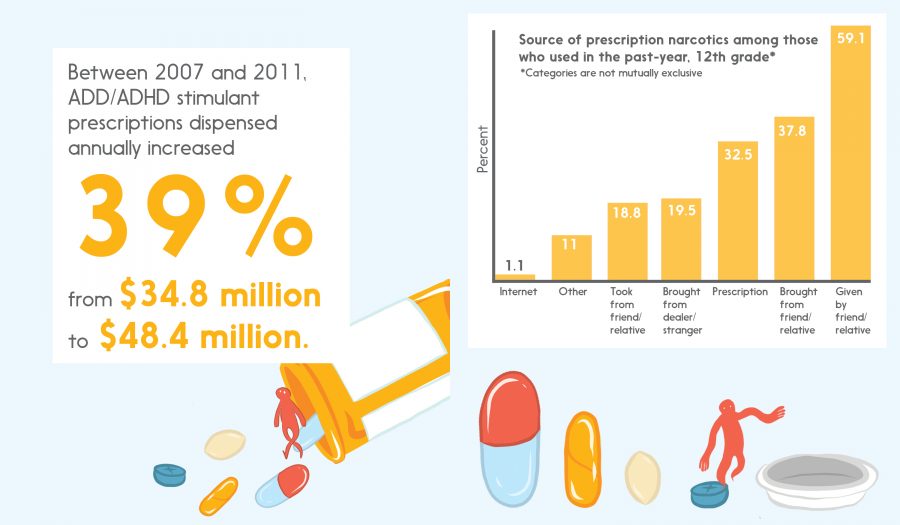
Carl smokes marijuana almost daily in the parking lot to settle his anxiety instead of taking prescription drugs. He trades the Adderall pills he no longer takes for marijuana or LSD, a psychedelic drug.
“[We trade] at school,” Carl said. “In the hallway at any point, or in class.”
Carl recalls friends who would push up the ceiling tiles in certain areas of the school to hide drugs. Or, if it was an in-person exchange, roll up the marijuana inside of pens. Not only is it a discreet exchange, but if the person is searched the pens will most likely be left alone.
On occasion he sells the pills for cash, but prefers to trade for marijuana. He recalls a huge spike in requests of Adderall before the Iowa Assessments.
Wesley also acquires a multitude of extra pills since he doesn’t consistently take his daily dosage. During midterms or finals, Wesley can make hundreds of dollars selling Adderall in a matter of days.
Dr. Flaum worries that the ease of acquiring Adderall through an ADD/ADHD diagnosis is going to have extremely negative effects on this generation of young adults.
“The truth is, ADHD is not a diagnosis you can make with a laboratory test. It isn’t really a diagnosis you can make with a full battery of neuropsychological assessments,” he said. “If you’re a smart kid, and [you] wanted to get Adderall, it would take you five minutes to look up the symptoms online, you would tell the symptoms to some stupid psychiatrist, and you would meet the diagnostic criteria for ADD. You can get a prescription for Adderall just like that.”
According to a report released by the Drug Enforcement Agency, the number of ADD/ADHD stimulant prescriptions dispensed annually increased 39 percent between 2007 (34.8 million) and 2011 (48.4 million).
This only backs Flaum’s claim of drugs being overprescribed, especially Adderall.
“We are unfortunately in an era where prescribing medicines is seen as a very reasonable thing to do. I personally think we will look back on this era shamefully.”
This era of “overprescription” didn’t come out of nowhere. Pharmaceutical companies spend billions of dollars pitching their product to doctors, associations and the consumer directly.
“It’s not a coincidence that psychiatrists prescribe all of these medicines. Pharmaceutical companies work very hard and very effectively to influence prescribe and practice,” Flaum said. “Community standard of practice is to prescribe a lot of medicine to a lot of people.”
According to Dr. Marcia Angell, the former editor-in-chief of the New England Journal of Medicine, about one fifth of the funding for the American Psychiatric Association comes from pharmaceutical companies. In her article, “The Illusions of Psychiatry”, she further explains how these drug companies attempt to gain the support of well-known psychiatrists at reputable academic medical centers. These esteemed psychiatrists are known as “key opinion leaders”, to the drug companies, who fund their research. This funded research influences the future of mental illness diagnoses and treatments through the writing and teaching of these doctors. Consequently, if a psychiatrist has research funded by a company, they may have a bias to reporting only positive things on that medication.
The consumers are directly affected by the word of their psychiatrist, but also the magazines they flip through. Shire Pharmaceuticals LLC is one of the biggest pharmaceutical companies that produces Adderall.
A U.S. Department of Justice (DOJ) announcement shows that In 2014, Shire was fined $56.5 million for making claims about Adderall without supporting clinical data. The DOJ report alleges that Shire claimed the drug would improve academic performance, reduce unemployment, and prevent criminal behavior.
However, this is just a small dent in the $1.03 billion revenue Shire made off Adderall in 2007—the final year covered by the DOJ settlement.
Despite the politics of the pharmaceutical industries, some medications are said to be truly life-saving by its users. Whether the user is actually taking it for the purpose of saving their own life; the companies, coaches, teachers, parents and psychiatrists will never know.
Editorial Policy: Sources may wish to have their names withheld from a particular story, and some may have valid reasons for this. The Editorial Board will decide on a case by case basis whether anonymity may be granted to protect the source. The Board recognizes that a high school is a very confined community of young people, and that some topics, while important to the community, may involve public embarrassment and official sanctions if names are printed. Once anonymity is granted, the Board must stand behind its decision, whatever the pressure. This, therefore, is a weighty decision.
Your donation will support the student journalists of West High School. Your contribution will allow us to purchase Scholarship Yearbooks, newsroom equipment and cover our annual website hosting costs.

Nina Elkadi is a senior at West and a third-year staffer. She is the Print Editor-in-Chief this year and would like to thank Kanye West for helping her...


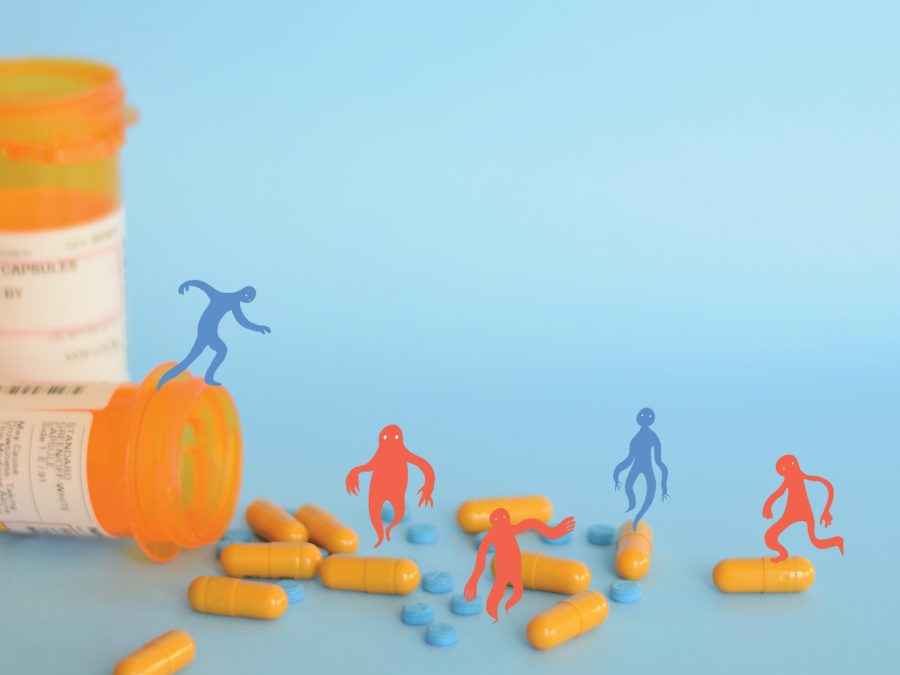
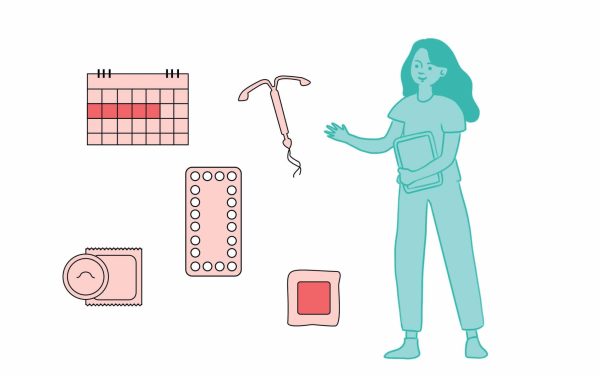


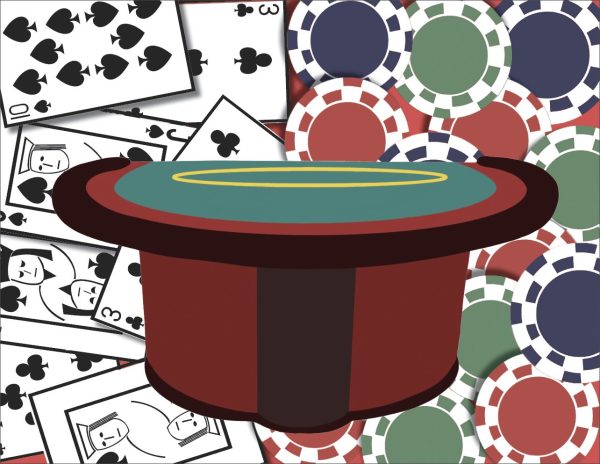


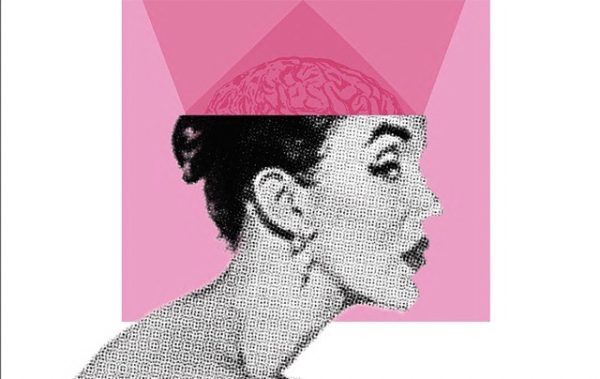




Ver Acity • Apr 29, 2017 at 5:30 am
These stories, while important and relevant, need to acknowledge that this phenomenon of people using this particular life saving medication for recreational drug use has absolutely nothing to do with the integrity and safety of Adderall and other ADHD medications.
Ewa Bardach • Apr 14, 2017 at 11:00 am
Excellent article shedding light on a serious issue. I believe that there is so much pressure to succeed that students resort to whatever it takes to do well academically while also engaging in extracurricular activities and maintaining a social life. All this takes a lot of energy and focus which not everyone can maintain 100% of the time. While I am not condoning the use of Adderall, I wonder if we expect too much too soon from our teenagers and they want to meet those expectations by any means necessary.